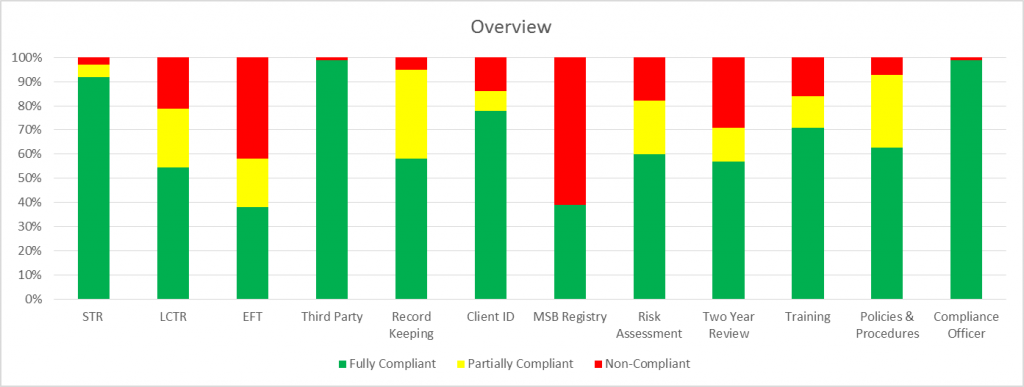We were fortunate enough to be able to attend the Canadian MSB Association (CMSBA)’s Montreal and Toronto spring training days. For Money Services Businesses (and those affiliated with the industry), the CMSBA is an excellent resource for collaboration, information sharing and advocacy. For those that were not able to attend any of the spring training sessions, here’s a roundup of the topics covered.
FINTRAC & MSB Compliance Examinations
Canada’s federal regulator for anti-money laundering (AML), the Financial Transactions and Reports Analysis Centre of Canada (FINTRAC), provided in depth statistics related to compliance examinations, as well as common issues for MSBs. Despite what some highly publicized administrative monetary penalties (AMPs) may lead you to believe, MSBs are faring well as a sector in FINTRAC’s compliance examinations. It’s noteworthy that through a freedom of information request, Outlier obtained data on the number of MSBs that did not have any deficiencies in examinations. Between 2008 and the end of 2014, this amounted to approximately 25% of all MSBs examined. In most cases, MSBs were largely compliant, with some partial deficiencies.
For a complete breakdown of common issues noted in examinations, click here.
AMF, Respondents & Digital Currency
Québec’s provincial regulator, the Autorité des Marchés Financiers (AMF), provided clarification on its expectations for MSB respondents. For MSBs dealing with customers in Québec that do not have offices in the province, a respondent must be nominated to deal with the AMF on the MSB’s behalf. Among the requirements are that the respondent must:
- Be over 18 years old;
- Have an address in Québec (home address or business address); and
- Not be under tutorship, curatorship or advisorship.
The AMF also addressed digital currency, noting that not all digital currency business models are covered by the Québec MSB Act, and that there must be an element of fiat currency involved in the transactions. Both the AMF’s press release from February 2015 and the current presentation confirmed that digital currency trading platforms (that include fiat currency transactions) and digital currency ATMs are considered in scope. As there are a myriad of other digital currency related business models, if you are unsure of where you fit, you can contact the AMF and receive a decision (we recommend that you request a decision in writing where possible).
Agency Agreements
I had the honour of speaking about MSB agency agreements (the agreements between MSBs and their agents) with Susan Han (previously of AUM Law). Like most things, agent agreements should be documented in writing and clearly spell out the terms of the agreement. MSBs that take on agents should understand that the MSB would bear most of the risk (financial, compliance and reputational). Agents should be aware that the client (and information about the client) “belongs” to the MSB rather than the agent (and this information should always be provided to the MSB when it is requested).
International Collaboration & De-Risking
The CMSBA has partnered with MSB associations worldwide to increase awareness of the negative ways in which de-risking (which CMSBA Director Ken Saul noted should be called de-banking) affects the financial system. As the de-risking issue has affected MSBs worldwide, and there does not appear to be any effective solutions under consideration, a whitepaper was developed and presented to the Financial Action Task Force (FATF). This whitepaper has received a positive reception. Stay tuned for more on the international efforts in this regard.
One of the few Canadian Financial Institutions that (openly) banks MSBs, Luminus Financial, was on hand to discuss factors that MSBs should consider when dealing with banking relationships. MSBs should be prepared to provide complete and transparent information about their business. In order to achieve success in both obtaining and maintaining banking relationships, MSBs should be able to demonstrate that they are compliant and present information in a way that is well organized and addresses all of the questions and requests that the bank has made. In some cases, this will be a higher standard than simply meeting the minimum compliance requirements set out in law and regulation.
Compliance Maturity Model
In looking proactively at issues related to de-risking and demonstrating compliance, the CMSBA is working to develop a compliance maturity model (CMM). Currently, CMSBA members can complete the first stage of this model by completing an attestation form online. The attestation states that the MSB is compliant with applicable legislation and not subject to administrative or criminal proceedings. Questions, comments or suggestions related to the CMM can be directed to cmsba-cmm@canadianmsb.org.
Need a Hand?
If you are an MSB that needs compliance assistance (or a bank that wants assistance in setting up and maintaining a compliance regime that effectively manages MSB related risk), please contact us.


